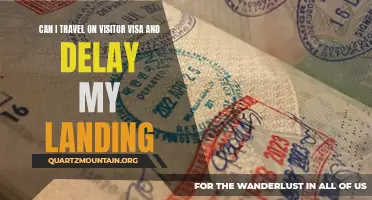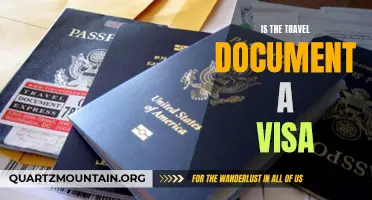
If you're planning a trip to Russia, you may be wondering whether you need a visa or not. Traveling to any foreign country can be complicated, especially when it comes to navigating the visa requirements. In the case of Russia, the visa application process can be strict and time-consuming, but understanding the requirements and procedures can make your trip much smoother. In this article, we will break down the visa requirements for travel to Russia, explaining the different types of visas available and how to obtain them. Whether you're going for business, tourism, or any other purpose, understanding Russia's visa requirements is essential before embarking on your journey.
What You'll Learn

Overview of visa requirements for travel to Russia
If you're planning to travel to Russia, it's important to familiarize yourself with the visa requirements. Russia has a strict visa policy, and most travelers will need a visa to enter the country. In this blog post, we will provide an overview of the visa requirements for travel to Russia.
Firstly, it's important to note that there are several types of visas available for travel to Russia, depending on the purpose of your visit. The most common types of visas for tourism and business travel are the tourist visa and the business visa, respectively.
To obtain a visa for travel to Russia, you will generally need to submit the following documents to the Russian embassy or consulate in your home country:
- A valid passport: Your passport should be valid for at least six months beyond your intended departure date from Russia. It should also have at least two blank pages for the visa stamp.
- A completed visa application form: You can usually download the visa application form from the website of the Russian embassy or consulate. Make sure to fill out the form accurately and legibly.
- A recent passport-sized photo: The photo should meet the specific requirements of the Russian embassy or consulate.
- Proof of travel arrangements: This can include a flight itinerary, hotel reservation, or an invitation from your host in Russia.
- Proof of travel insurance: It's recommended to have travel insurance that covers medical expenses, trip cancellation, and other unforeseen events.
- Visa support documents: Depending on the type of visa you're applying for, you may need additional documents to support your application. For example, if you're applying for a tourist visa, you may need a tourist voucher or a letter of invitation from a tour agency.
- Visa fee: There is usually a fee associated with the visa application process. The fee can vary depending on the type and duration of the visa.
Once you have gathered all the necessary documents, you can submit your visa application to the Russian embassy or consulate in your home country. The processing time for a Russian visa can vary depending on the embassy or consulate and the type of visa you're applying for. It's recommended to apply well in advance of your planned travel dates to allow for any unforeseen delays.
In some cases, it may be possible to obtain a visa on arrival at certain Russian airports. However, this option is only available for citizens of a few select countries. It's important to check with the Russian embassy or consulate in your home country to determine if you're eligible for a visa on arrival.
In conclusion, if you're planning a trip to Russia, it's essential to understand the visa requirements and to allow enough time to gather the necessary documents and submit your visa application. By following the guidelines provided by the Russian embassy or consulate and by planning ahead, you can ensure a smooth and hassle-free travel experience to Russia.
Exploring the Possibility: Travelling with an F1 Visa - What You Need to Know
You may want to see also

Types of visas available for traveling to Russia
If you are planning a trip to Russia, you will need to obtain a visa before you can enter the country. Russia has several types of visas available for travelers, depending on the purpose and duration of your trip. Here are the most common types of visas for traveling to Russia:
- Tourist Visa: This type of visa is suitable for those who plan to visit Russia for tourism purposes. It is valid for a short period, typically up to 30 days, and can be either single-entry or double-entry. The tourist visa is usually issued for a specific period and cannot be extended beyond its validity.
- Business Visa: If you are traveling to Russia for business purposes, such as attending conferences, meetings, or negotiations, a business visa is required. This type of visa allows you to stay in Russia for a longer period, up to 90 days. It can be single-entry, double-entry, or multiple-entry, depending on your needs.
- Work Visa: If you are planning to work in Russia, you will need a work visa. This visa is obtained through your employer and allows you to stay in Russia for the duration of your employment contract. The work visa can be extended or converted into a residence permit if you decide to stay longer.
- Student Visa: If you are going to study in Russia, you will need to obtain a student visa. This visa is issued to international students enrolled in Russian educational institutions and allows them to stay in the country for the duration of their studies. The student visa can usually be extended if necessary.
- Private Visa: If you are traveling to Russia to visit relatives or friends, you can apply for a private visa. This type of visa requires an invitation from a Russian citizen or a foreign citizen residing in Russia. The private visa is usually valid for up to 90 days and can be single-entry or double-entry.
- Transit Visa: If you are transiting through Russia to reach your final destination, you may need a transit visa. This visa allows you to stay in Russia for a short period, usually up to 3 days. To obtain a transit visa, you will need to provide proof of your onward travel, such as a ticket to your final destination.
To apply for a Russian visa, you will need to submit certain documents, including a completed application form, a valid passport, a recent passport-size photo, and an invitation letter, depending on the type of visa you are applying for. It is recommended to apply for a visa well in advance of your planned travel dates, as the process can take several weeks.
In summary, there are several types of visas available for traveling to Russia, including tourist, business, work, student, private, and transit visas. Each visa has its own requirements and restrictions, so it is important to carefully review the visa requirements and gather all the necessary documents before applying. By obtaining the correct visa, you can ensure a smooth and hassle-free journey to Russia.
Traveling to Canada with a Valid US Immigrant Visa: What You Need to Know
You may want to see also

Application process for obtaining a visa to Russia
If you are planning to travel to Russia, it is important to be aware of the visa requirements and the application process to ensure a smooth and hassle-free trip. In this article, we will guide you through the application process for obtaining a visa to Russia.
Determine the type of visa you need:
- Tourist visa: This type of visa is suitable if you are planning to visit Russia for tourism purposes, such as sightseeing or visiting friends and relatives.
- Business visa: If you are traveling to Russia for business-related activities, such as attending conferences or meetings, you will need a business visa.
- Transit visa: If you are transiting through Russia to another destination and will be staying in the country for less than 72 hours, a transit visa is required.
Gather the required documents:
Depending on the type of visa you are applying for, the required documents may vary. However, in general, you will need the following documents:
- Valid passport with at least six months of validity beyond the intended departure date.
- Completed visa application form.
- Two recent passport-sized photos.
- Visa invitation letter or a confirmation of the hotel reservation for the duration of your stay in Russia.
- Proof of travel insurance.
- Proof of sufficient funds to cover your stay in Russia (e.g., bank statements, credit card statements).
- A letter of introduction from your employer (for business visa applicants).
Find a Russian visa application center or consulate:
To apply for a visa to Russia, you will need to visit a Russian visa application center or consulate in your country. These centers/consulates will assist you in the application process and collect all the required documents.
Submit your application:
Visit the Russian visa application center or consulate in person and submit your application along with the required documents. Make sure to double-check that you have all the necessary documents to avoid any delays or rejections.
Pay the visa fee:
There is a non-refundable visa fee that must be paid when you submit your application. The fee may vary depending on your nationality and the type of visa you are applying for. Check with the application center or consulate for the exact fee amount.
Wait for processing:
The processing time for a Russian visa can vary, so it is advisable to apply well in advance of your intended travel dates. Typically, the processing time ranges from 5 to 20 business days. However, some centers may offer expedited processing for an additional fee.
Collect your passport and visa:
Once your visa application is processed, you will be notified to collect your passport with the visa attached. Make sure to bring the receipt given at the time of application pickup.
It is important to note that visa requirements and processes can change, so it is recommended to check the latest information from the Russian embassy or consulate in your country before applying. By following these steps and ensuring that you have all the necessary documents, you can successfully obtain a visa to Russia and enjoy your trip to this fascinating country.
Exploring the Travel Opportunities for 485 Visa Holders in Australia
You may want to see also

Important considerations for visa-free travel to Russia
Traveling to Russia can be an exciting and memorable experience. However, before embarking on your journey, it's important to understand the requirements for visa-free travel to Russia. While some countries have an agreement with Russia that allows their citizens to enter without a visa for a certain period, there are still important considerations to keep in mind. Here are a few things to keep in mind for visa-free travel to Russia:
- Eligibility: Not all nationalities are eligible for visa-free travel to Russia. It's important to check with the Russian embassy or consulate in your country to see if your nationality is eligible. Additionally, the duration of visa-free travel can vary depending on your country of origin. Make sure to find out the specific requirements for your nationality.
- Length of Stay: Even if visa-free travel is allowed, there is usually a maximum stay limit imposed. This varies depending on the country of your citizenship. Ensure you understand the permitted length of stay before making your travel plans. Overstaying your allotted time can result in penalties or difficulties when leaving the country.
- Purpose of Visit: Visa-free travel usually has restrictions on the purpose of your visit. For example, the exemption may only apply to tourist visits and not to business or work-related trips. It's important to clarify the purpose of your visit with the Russian embassy or consulate to ensure you meet all requirements.
- Registration: Upon arrival in Russia, you are required to register your stay with the local authorities within a certain timeframe. This applies to both visa and visa-free travelers. Ensure you are familiar with the registration process and the specific requirements for your type of travel.
- Entry and Exit Points: The visa-free travel agreement might only be applicable at specific entry and exit points. For example, if you are arriving by air, your visa-free privilege might only be valid at certain international airports. Make sure to carefully plan your travel itinerary to ensure compliance with the entry and exit requirements.
- Travel Insurance: It's highly recommended to have travel insurance when visiting Russia, even for visa-free travel. Medical emergencies or accidents can happen at any time, and having adequate travel insurance ensures you receive the necessary medical attention without incurring significant expenses.
- Currency and Customs Regulations: Familiarize yourself with the currency exchange regulations and customs regulations before traveling to Russia. Each country has its own rules regarding the amount of currency that can be brought in or taken out of the country. Knowing these rules will help you avoid any unnecessary complications during your trip.
- Secure Your Documents: It's crucial to keep your travel documents, including your passport and any necessary supporting documents, safe and secure during your trip. It's wise to make copies of your important documents and store them separately, should you need them in case of loss or theft.
Remember, even though visa-free travel to Russia might seem convenient, it's essential to ensure you meet all the requirements and adhere to the regulations. Otherwise, you may encounter difficulties or even be denied entry to the country. By keeping these important considerations in mind, you can make the most of your visa-free travel to Russia and have a smooth and enjoyable journey.
Traveling with a K1 Visa: What You Need to Know
You may want to see also







